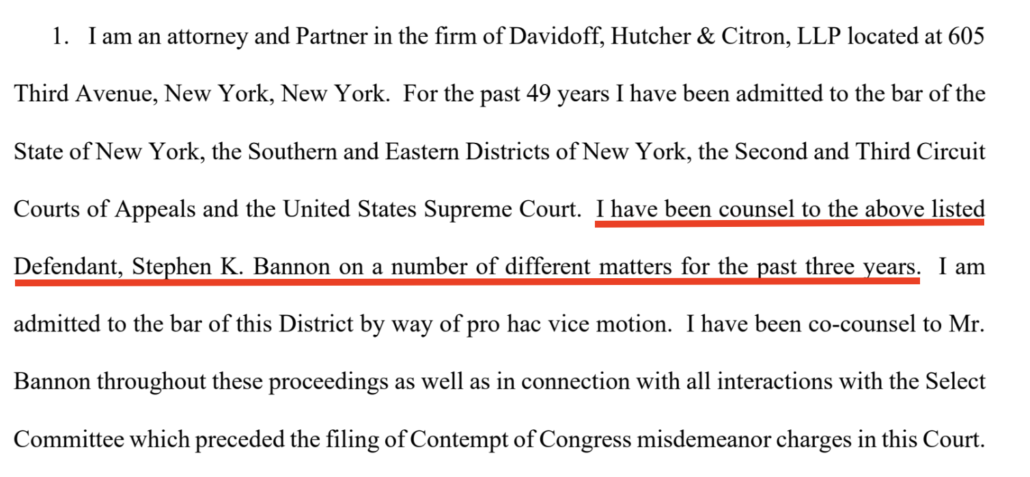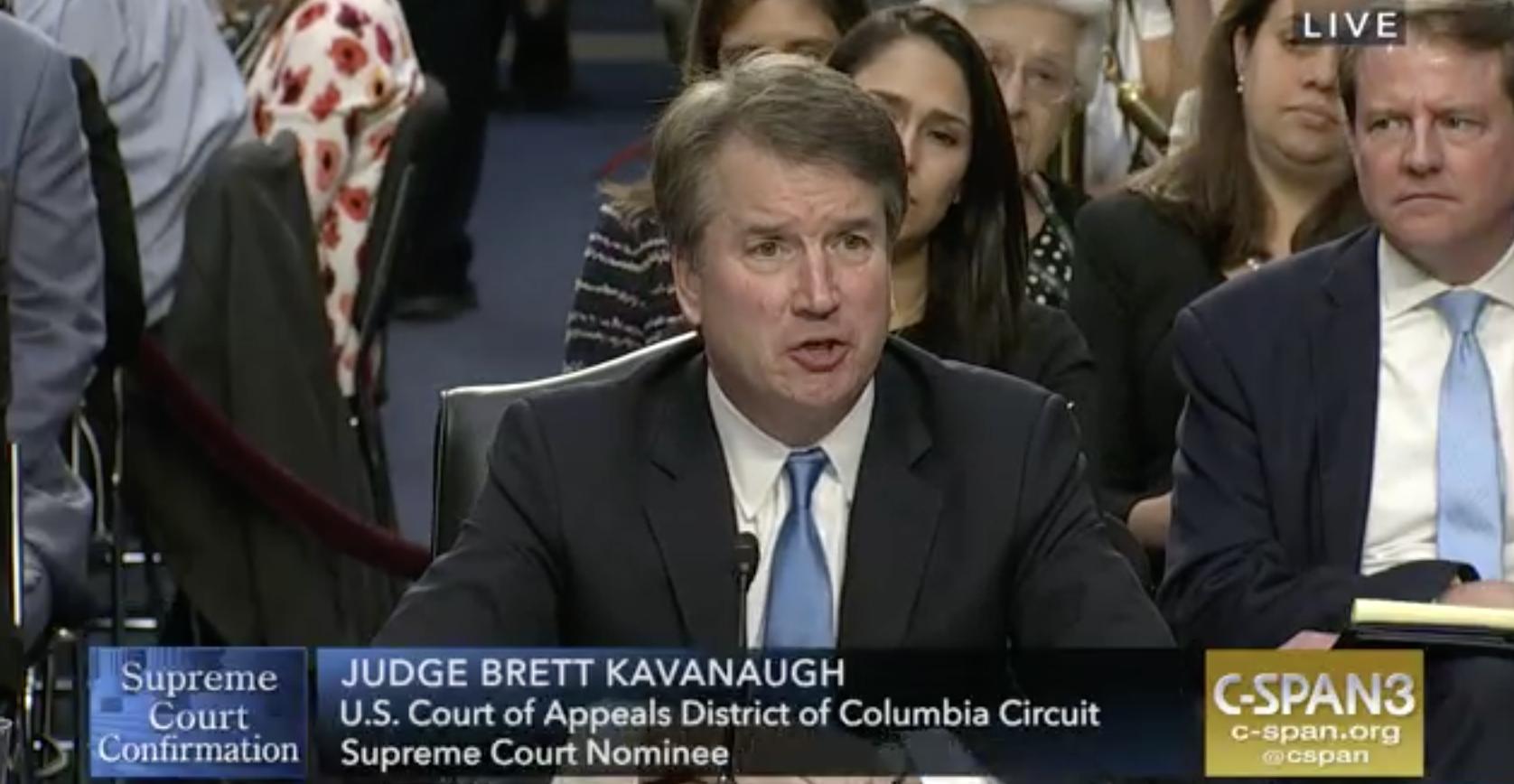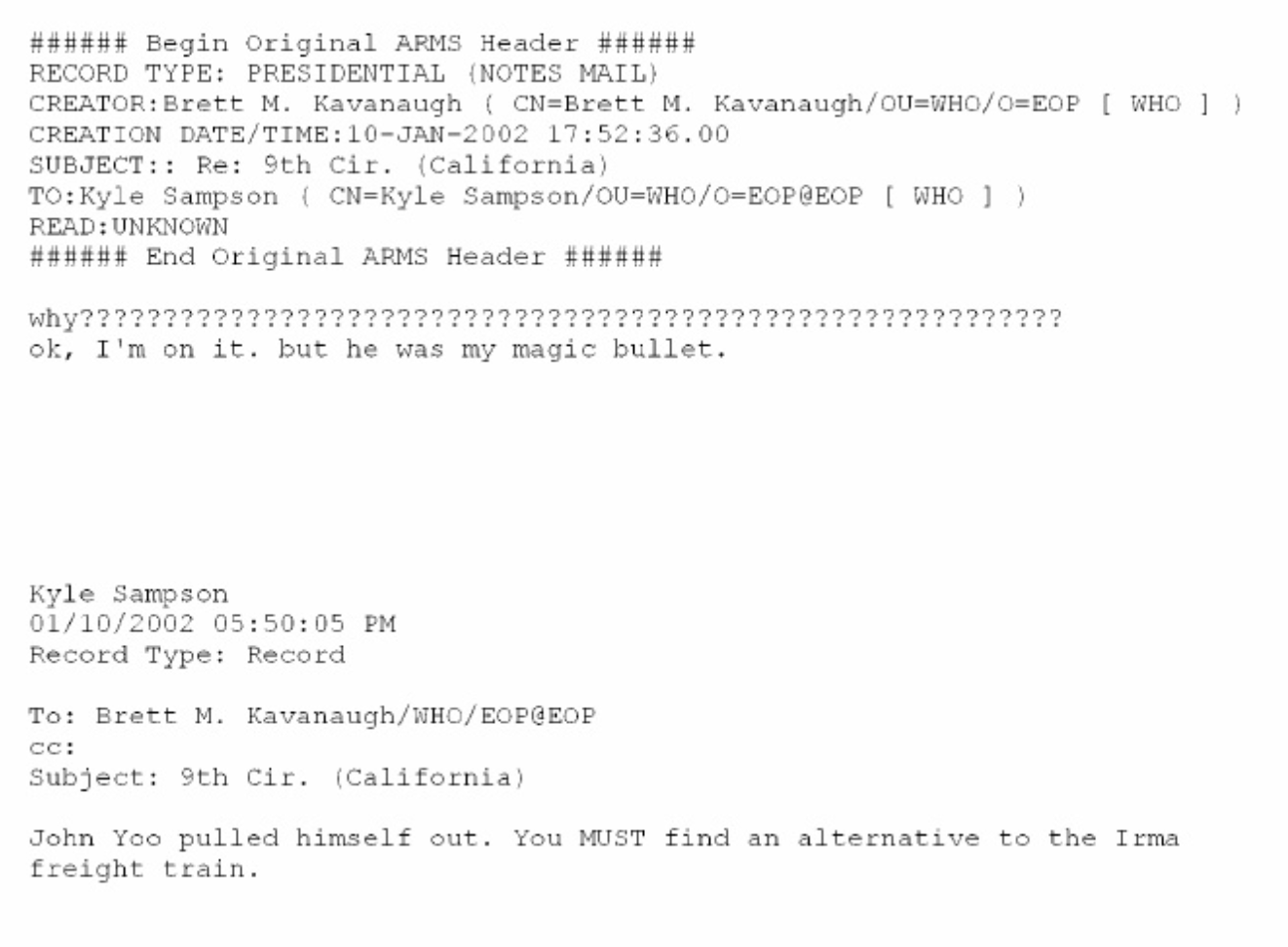Murray Waas, who writes about one and only one subject on the Russian investigation, has for the second time written a story claiming that a report Don McGahn wrote on February 15, 2017 — and not Trump’s serial offers to pardon people who are serving as his firewall — is “the strongest evidence to date implicating the president of the United States in an obstruction of justice” and “the most compelling evidence we yet know of that Donald Trump may have obstructed justice.” Murray then goes on to parrot Rudy Giuliani’s preferred narrative about what would happen next.
Several people who have reviewed a portion of this evidence say that, based on what they know, they believe it is now all but inevitable that the special counsel will complete a confidential report presenting evidence that President Trump violated the law. Deputy Attorney General Rod Rosenstein, who oversees the special counsel’s work, would then decide on turning over that report to Congress for the House of Representatives to consider whether to instigate impeachment proceedings.
Because even people covering the story closely mistake the Flynn firing for an obstruction crime instead evidence of the conspiracy, I’d like to lay out why this story is silly. This will lay out things implicit in this post, which shows that in fact the White House narrative about Flynn is all an effort to treat his firing as obstruction and not “collusion.”
Neither story about Don McGahn’s exoneration of Trump should be credited
Murray claims that because Trump knew that Mike Flynn was under investigation when he asked Jim Comey to let the investigation into Flynn go, it will undercut an explanation offered in January that Trump thought Flynn had been cleared by the FBI.
In arguing in their January 29 letter that Trump did not obstruct justice, the president’s attorneys Dowd and Sekulow quoted selectively from this same memo, relying only on a few small portions of it. They also asserted that even if Trump knew there had been an FBI investigation of Flynn, Trump believed that Flynn had been cleared. Full review of the memo flatly contradicts this story.
The memo’s own statement that Trump was indeed told that Flynn was under FBI investigation was, in turn, based in part on contemporaneous notes written by Reince Priebus after discussing the matter with the president, as well as McGahn’s recollections to his staff about what he personally had told Trump, according to other records I was able to review. Moreover, people familiar with the matter have told me that both Priebus and McGahn have confirmed in separate interviews with the special counsel that they had told Trump that Flynn was under investigation by the FBI before he met with Comey.
Murray repeats a suspect McGahn timeline describing himself, along with Reince Priebus and White House lawyer John Eisenberg, “confronting” Flynn about intercepts showing that he had raised sanctions with Kislyak, contrary to what (they were claiming) he had told them.
On February 8, 2017, The Washington Post contacted the White House to say that it was about to publish a story citing no less than nine sources that Flynn had indeed spoken to Kislyak about sanctions. In attempting to formulate a response, Priebus, McGahn, and Eisenberg questioned Flynn. Confronted with the information that there were intercepts showing exactly what was said between him and Kislyak, Flynn’s story broke down. Instead of denying that he had spoken to Kislyak about sanctions, the timeline said, Flynn’s “recollection was inconclusive.” Flynn “either was not sure whether he discussed sanctions, or did not remember doing so,” the McGahn timeline says.
Priebus then “specifically asked Flynn whether he was interviewed by the FBI,” the timeline says. In response, “Flynn stated that FBI agents met with him to inform him that their investigation was over.” That claim, of course, was a lie. The FBI never told Flynn their investigation of him was over. Shortly thereafter, Vice President Pence, Priebus, and McGahn recommended that Flynn be fired.
According to the story Murray got snookered into repeating, because those three never informed Trump about this confrontation, his understanding of the investigation would remain what Priebus and McGahn had already briefed him — that Flynn was under investigation — and so by asking Comey to back off, he was obstructing justice.
In arguing that the president did nothing wrong, Trump defense attorneys John Dowd and Jay Sekulow, in both informal conversations and later in formal correspondence with the special counsel, relied on the false statements of Flynn to Priebus, McGahn, and Eisenberg that the FBI had closed out their investigation of him. In the attorneys’ reasoning, if Trump had no reason to think that Flynn was under criminal investigation when he allegedly pressured Comey to go easy on Flynn, the president did not obstruct justice. More broadly, Sekulow and Dowd argued in correspondence with the special counsel that the “White House’s understanding” was that “there was no FBI investigation that could conceivably have been impeded” at the time of Trump’s White House meeting with Comey.
But Sekulow and Dowd’s account of these conversations is partial and misleading. In fact, there is no information or evidence that Flynn’s false assertions were ever relayed to the president.
Murray doesn’t ask an obvious question: why, if Priebus and McGahn had already briefed Trump that Flynn was under investigation, they would have to confront Flynn about it. Nor does he mention a lot of other relevant details.
Two narratives
Before I get into the most relevant details, consider what we’re looking at: what Murray claims is his scoop, which provides more details on the original McGahn report, written the day after Trump tried to get Comey to end an investigation into why Mike Flynn lied about his conversation about sanctions on December 29, 2016. As always seemed the case and still appears to be true based on Murray’s claims about the report, the McGahn report misrepresented what Sally Yates said and a bunch of other things, but in so doing laid out a narrative whereby the firing of Mike Flynn would serve as punishment for something Flynn did wrong.
Murray contrasts that with the letter Trump’s lawyers sent at the end of January but leaked in June in part to feed a narrative — one that had already been debunked — that Mueller was primarily investigating Trump for obstruction. The letter was Jay Sekulow and John Dowd’s attempt, in the wake of Mike Flynn’s cooperation agreement, to use the McGahn narrative to spin the firing of Flynn. In the January 29, 2018 telling, Flynn is not at fault, he’s just confused. And so, in the January letter, is the president. It portrays a story where no one really knew what Flynn said to Kislyak and everything that followed was just a big game of confused telephone for which the participants can’t be held legally liable. If Flynn were confused, of course, then his purported lies to Mike Pence would need to be excused, which is probably why Sekulow and Dowd didn’t address that part of the story.
When this whole process started — before Trump fired Jim Comey and in the process extended the investigation and got Robert Mueller looking into the stories being told — McGahn and Priebus and everyone else probably presumed that firing Flynn would shut everything down. That was the intent, anyway. Fire Flynn, end of investigation about why he lied to the FBI about discussing sanctions with Sergei Kislyak. And if you end the investigation, there would be no further scrutiny into what everyone else knew at the time, nor would anyone ask Comey and Yates their side of the story.
Of course, Trump fucked that all up, and fired Comey, which led to Mueller’s appointment, which led to his convening of a grand jury, which led to all that falling apart.
Bill Burck’s other clients already knew that Flynn had discussed sanctions
Which brings us to the most important of the missing details.
As noted, Trump couldn’t leave well enough alone and so fired Comey which led to Mueller which led to an actual investigation which led, in August, to Mueller obtaining the transition communications of 13 key members of the transition team, unmediated by Trump lawyers, who at the time were just responding to wholly inadequate document requests from Congress and sharing with Mueller.
Specifically, on August 23, 2017, the FBI sent a letter (i.e., not a subpoena) to career GSA staff requesting copies of the emails, laptops, cell phones, and other materials associated with nine PTT members responsible for national security and policy matters. On August 30, 2017, the FBI sent a letter (again, not a subpoena) to career GSA staff requesting such materials for four additional senior PTT members.
Among others, Mueller would have obtained emails that would have revealed that contrary to the story the White House had told in early January 2017 (which Murray repeats in his story), numerous Transition officials were aware of the emails regarding sanctions. Indeed, Reince Priebus, along with Flynn, Steve Bannon, Sean Spicer, and two other people (Kushner’s inclusion is implied elsewhere in the story), got forwarded an email KT McFarland sent Tom Bossert the day that Mike Flynn made his calls with Kislyak, talking about Flynn’s upcoming call with Kislyak and the need to avoid public comment defending Russia. McFarland also relayed what Obama’s Homeland Security Czar, Lisa Monaco, expected from the call, and the expectation Kislyak would respond with threats.
On Dec. 29, a transition adviser to Mr. Trump, K. T. McFarland, wrote in an email to a colleague that sanctions announced hours before by the Obama administration in retaliation for Russian election meddling were aimed at discrediting Mr. Trump’s victory. The sanctions could also make it much harder for Mr. Trump to ease tensions with Russia, “which has just thrown the U.S.A. election to him,” she wrote in the emails obtained by The Times.
[snip]
McFarland wrote, Mr. Flynn would be speaking with the Russian ambassador, Mr. Kislyak, hours after Mr. Obama’s sanctions were announced.
“Key will be Russia’s response over the next few days,” Ms. McFarland wrote in an email to another transition official, Thomas P. Bossert, now the president’s homeland security adviser.
[snip]
Bossert forwarded Ms. McFarland’s Dec. 29 email exchange about the sanctions to six other Trump advisers, including Mr. Flynn; Reince Priebus, who had been named as chief of staff; Stephen K. Bannon, the senior strategist; and Sean Spicer, who would become the press secretary.
[snip]
“If there is a tit-for-tat escalation Trump will have difficulty improving relations with Russia, which has just thrown U.S.A. election to him,” she wrote.
Mr. Bossert replied by urging all the top advisers to “defend election legitimacy now.”
[snip]
Obama administration officials were expecting a “bellicose” response to the expulsions and sanctions, according to the email exchange between Ms. McFarland and Mr. Bossert. Lisa Monaco, Mr. Obama’s homeland security adviser, had told Mr. Bossert that “the Russians have already responded with strong threats, promising to retaliate,” according to the emails.
Flynn took orders on and relayed his results to McFarland, who was in Mar-a-Lago with Trump. And the transition team, when it complained that Mueller obtained these emails, suggested that they would have — perhaps did, in their compliance with congressional requests — treat this one as privileged. The day after Flynn’s calls, Trump hailed the outcome his National Security Advisor appointee had accomplished on the calls the day before.

In other words, a great deal of evidence suggests that Trump not only knew what went on in those calls, but directed Flynn through McFarland to placate the Russians.
Within days after the call, Flynn briefed other members of the transition team on the call. It is highly unlikely that he lied to people who had been informed in advance of his call that he would be discussing sanctions.
FBI may have believed, in January 2017 and even February 2017, when McGahn wrote his memo, that Flynn lied on his own, to hide the contents of his calls from others in the Administration. But by November 2017, they knew that the most important people in the transition — including Bill Burck’s other clients, Steve Bannon and Reince Priebus — knew well what had transpired in the calls with Kislyak.
None of this, of course, shows up in the tale White House sources are telling Murray. As a result, he tells a story that presents the McGahn narrative as more closely matching the “truth” than the later Sekulow and Dowd letter.
The problems with the McGahn narrative
But neither are true, and so while it’s nifty for Murray to claim this is the biggest yet proof of obstruction (it’s not, compared to the pardons promised), that’s not actually what happened, and Mueller would know that.
For example, the entire story about Flynn lying to Pence — which is something Sekulow and Dowd simply ignored in their January letter — is probably not true; and if it is, key White House staffers, including at least two of Burck’s clients, were lying to the nominal Transition head and were parties to Flynn’s lie.
On January 12, 2017, Washington Post columnist David Ignatius disclosed that US intelligence agencies had intercepted the phone calls, although Ignatius’s sources did not disclose the specifics of what either Flynn or Kislyak said. Vice President Mike Pence was immediately enlisted to defend Flynn. Flynn assured Pence that he never spoke to Kislyak about sanctions, whereupon Pence repeated those denials on Fox News and CBS’s Face the Nation. Flynn was then also questioned by the FBI about the phone calls, but once again denied that he had ever spoken to Kislyak about sanctions.
Similarly, the notion that Priebus would have to ask Flynn what he said to Kislyak on February 8 (when he had known it would include sanctions before Flynn made the call) is nonsense.
On February 8, 2017, The Washington Post contacted the White House to say that it was about to publish a story citing no less than nine sources that Flynn had indeed spoken to Kislyak about sanctions. In attempting to formulate a response, Priebus, McGahn, and Eisenberg questioned Flynn. Confronted with the information that there were intercepts showing exactly what was said between him and Kislyak, Flynn’s story broke down. Instead of denying that he had spoken to Kislyak about sanctions, the timeline said, Flynn’s “recollection was inconclusive.” Flynn “either was not sure whether he discussed sanctions, or did not remember doing so,” the McGahn timeline says.
Both Priebus and Flynn would know better. It’s possible Flynn and Priebus were putting on a show for the lawyers (but if so, that show would likely be just for John Eisenberg, because otherwise Burck would have a major conflict). It’s more likely the McGahn narrative was an attempt to make the internal story consistent with the public claims that only Flynn knew of the content of the calls.
One of the other key pieces of bullshit in the McGahn narrative is the claim that there was any doubt whether Flynn could be fired when Yates first presented her concerns to McGahn.
The McGahn timeline recounts: “Part of [our] concern was a recognition by McGahn that it was unclear from the meeting with Yates whether or not an action could be taken without jeopardizing an ongoing investigation.”
She clearly suggested (and would be backed by Mary McCord) that’s what they should do.
Finally, there’s something else missing from this narrative: that Flynn had spent the weekend between this alleged grilling from Priebus and McGahn in Mar-a-Lago with the President, sitting in on yet more sensitive meetings (in that case, with Shinzo Abe).
McGahn’s narrative may offer an explanation for why Trump fired Flynn, even if it doesn’t accord with known facts. But the entire narrative fails to explain why, if all the players knew and did what they said, Trump didn’t fire Flynn as soon as Yates suggested he should, or after they reviewed the intercepts (showing what they knew the conversation entailed), or after Priebus and McGahn grilled Flynn.
Which is not to say that McGahn’s letter isn’t proof of obstruction (albeit far less damning than Trump’s offers of pardons). It’s just an entirely different model of obstruction, and Murray’s story may be yet more PR from Don McGahn to make sure he’s on the right side of any obstruction charges.









